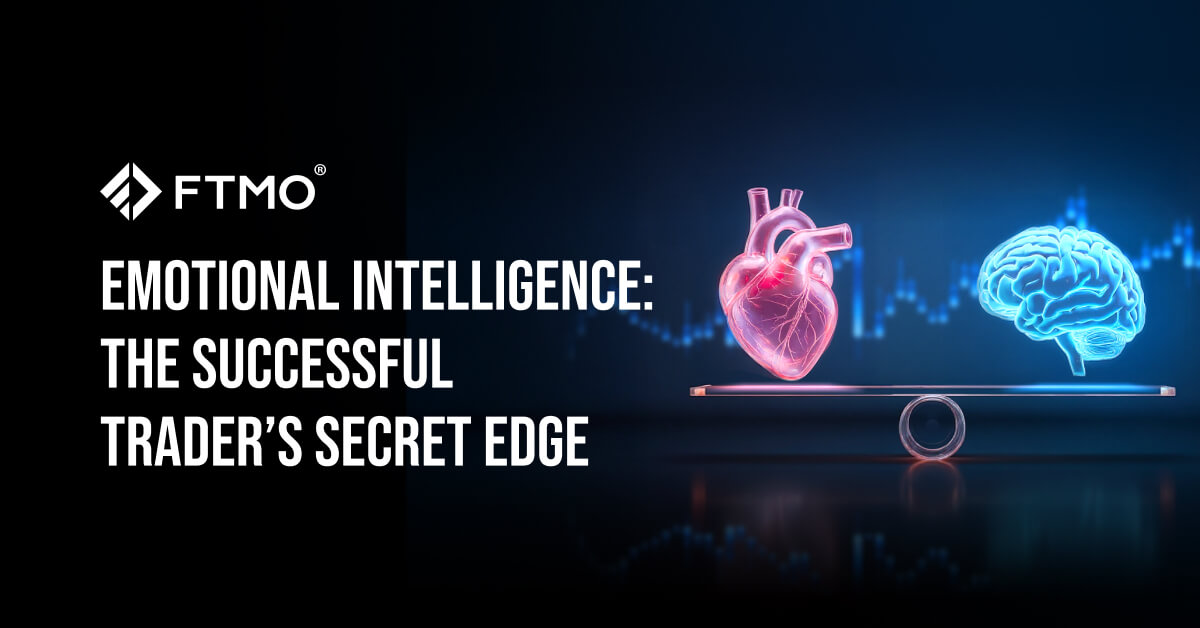
Emotional Intelligence: The Successful Trader’s Secret Edge
Most traders spend years perfecting strategies, studying indicators, and backtesting setups. Yet, one of the most powerful tools for long-term success has nothing to do with charts; it’s your ability to understand and manage emotions.
This is where emotional intelligence (EQ) comes in. Traders with high emotional intelligence have a huge edge, not because they avoid emotions, but because they know how to work with them instead of against them.
What Is Emotional Intelligence?
Emotional intelligence is the ability to recognise, understand, and regulate both your own emotions and the emotions of others. It’s a skill that blends self-awareness, self-control, empathy, and adaptability.
In trading, emotional intelligence doesn’t mean you stop feeling fear, greed, or frustration. It means you know when those emotions are present and how to respond in a way that supports your goals instead of sabotaging them.
Why Emotional Intelligence Matters in Trading
Trading is a psychological game. You can have a profitable system, but without the right mindset, your execution will fail. Emotional intelligence helps you:
• Stay Calm Under Pressure: Instead of panicking during volatility, you remain focused and rational.
• Control Impulse: EQ keeps you from chasing trades, overleveraging, or revenge trading.
• Recover from Losses Faster: You process disappointment without letting it spiral into fear or recklessness.
• Read Market Sentiment: Just as you recognise your own emotions, you can sense collective trader behaviour – fear-driven selling, greed-driven rallies, and hesitation.
• Maintain Discipline: High EQ supports patience, consistency, and sticking to your plan.
• Improve faster: With high self-awareness you can spot mistakes faster and work on them more effectively.
The Core Components of Emotional Intelligence for Traders
1. Self-Awareness
Recognise what you’re feeling and how it impacts your decisions. For example, noticing frustration building after a losing streak can stop you from revenge trading.
2. Self-Regulation
The ability to pause before reacting. Instead of chasing a breakout impulsively, you wait for confirmation.
3. Motivation
Staying focused on long-term goals, not short-term gratification. Traders with high EQ don’t measure success trade by trade, but by following their process.
4. Empathy
In markets, empathy means understanding how other traders are likely to feel and react. This perspective sharpens your edge in reading sentiment.
5. Social Skills
For those in trading communities or teams, good communication, feedback, and support networks are crucial to staying grounded.
How to Develop Emotional Intelligence as a Trader
1. Practice Emotional Journaling
Don’t just record trades – record how you felt before, during, and after. Over time, you’ll see patterns between emotions and performance.
2. Build a Pause Habit
When emotions surge, step back. A few deep breaths or a short walk can be the difference between discipline and disaster.
3. Reframe Losses
Instead of seeing losses as failure, view them as data. This mindset reduces fear and helps you grow.
4. Mindfulness and Meditation
Training yourself to stay present strengthens both self-awareness and emotional control. Even 5 minutes a day helps.
5. Seek Feedback
Sometimes others see our blind spots better than we do. Share your experiences with a mentor or trading group.
The Takeaway
Emotional intelligence is not about suppressing emotions – it’s about harnessing them. Fear can protect you from reckless risk. Frustration can highlight where you need improvement. Excitement can fuel motivation.
The difference between amateurs and professionals often comes down to EQ. While strategies evolve and markets change, your ability to manage yourself under pressure remains your most valuable edge. The smarter you become with emotions, the better trader you might become.
About FTMO
FTMO developed a 2-step Evaluation Process to find trading talents. Upon successful completion you can get an FTMO Account with a balance of up to $200,000. How does it work?.










